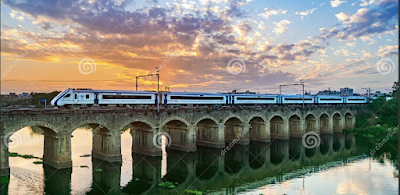“Drawing parallels” between an organization and a train – confused? Read more
I have been always fond of train
journeys since my childhood. I still have those vivid memories and visuals
ingrained of the rolling countryside, green paddy fields during monsoons and
flowing rivers as you cross over long bridges. With time a lot of this has
changed. Now there are sights of bustling cities, towns, and houses along the
tracks across the country.
Recently, I made a trip to Mumbai
from Pune and back on two different trains. During this trip, I observed many
nuances of the people around me…. noticed how passengers around me reacted and
reflected on them. I felt there were so many parallels I could draw between an organization
and a train.
Here are some
|
Aspect |
For the
train |
For an
organization |
|
Engine and its
driver |
This duo is
what makes the train run and ensures a smooth journey. This is the heart and
brain of the train -
If the driver is experienced, he/she knows how
to make the machine work and maintain a smooth ride throughout. -
The train speed can vary based on track
conditions and terrain; however, the driver knows how to handle real-time
situations. -
If the engine is good and responsive, it makes
the driver's job a bit easier and ensures the train runs as planned. |
A well-defined purpose
& vision along with the core leadership team (which is the driver here)
sets the pace and drives an organization -
When the purpose and vision are clear across
the levels of an organization, the journey becomes easier -
When the leadership is experienced and
understands the needs of the organization and tailoring it based on the need
of the hour, they manage it impeccably |
|
Brakes |
This is the
most essential element of a train. As much as we love the speed of a fast
train, it is ever more crucial to know how well it brakes when needed. The
art of applying the brakes depends on the driver as to how well he/she anticipates
and decides to apply the same. It is important
to slow down when the track or terrain demands. |
Every
organization wants to grow as soon as possible. After all growth in terms of
revenue, market share etc. is key. However, it is very important to take a
pause at times and see if the pace and direction at which it is trying to move
is apt or does it needs some course correction. Internal
processes, checks and balances and internal feedback loop should be
considered as the brakes |
|
Coaches |
In a
long-distance train, you will often see a variety of coaches catering to
different customer segments and managing some key services like catering,
luggage holding etc. No matter where
you sit, the train needs to take all of them together and reach their
destination. All the classes
of coaches need to keep up with the engine, or else we all know what could happen. |
Like coaches in
a train, the organization has several business lines, and departments
catering to internal and external customers. Unless they are
well-oiled and acknowledge the need to work in tandem and for each other (not
against each other) there will be friction and possibly no alignment with the
overall vision and purpose |
|
Track and
signal system |
When a train
runs at high speeds on those two parallel rails, a lot of credit goes to the
tracks, their maintenance and the signalling system that ensures we are on a
safe path. We may not see all those unsung heroes who work behind the scenes
to make this happen. A wrong signal,
a weak track, a missing fishplate etc. can cause havoc. |
Strong
procedures, internal guardrails, periodic audits, and many such things
provide indications to an organization as to where it is heading and what is
potentially coming. When all goes
well, we seldom acknowledge their importance, but when it does not… |
|
Passengers |
Every passenger
irrespective of the coach/class where he/she is seated has some expectation
from the journey. Some want good
food, some may want to rest, others may want to reach the destination sooner
or at least on time, and some may want to have a party. Certainly, all
would like to have a clean and safe journey. It is
practically impossible that everyone will be happy at the end and all hopes
are met. If you are
lucky enough to get good co-passenger(s) your journey seems like a breeze, but
it could feel endless if something goes wrong. |
Employees of an
organization work for different groups and departments. Each one of them has
some expectations from the workplace and the organization. What motivates
some may not be good for others. It is almost impossible to say that all
policies will be loved by everyone. However, what
matters is that everyone professionally conducts themselves and works towards
the common organization objective. The journey
tends to get sweeter when the team works smarter and finds time to kindle
with like-minded ones. |
Does this resonate with you? Have
you experienced interesting parallels during your journeys? Share your thoughts
and would love to learn from you.


